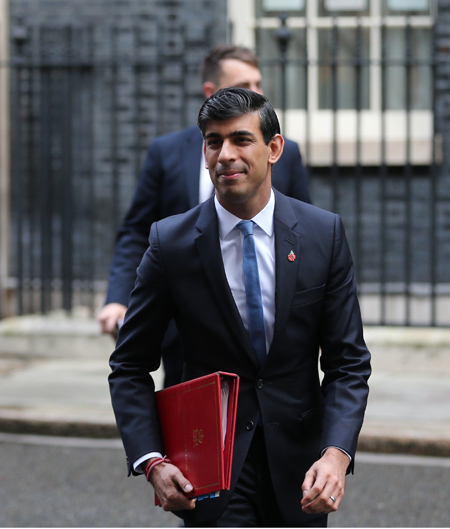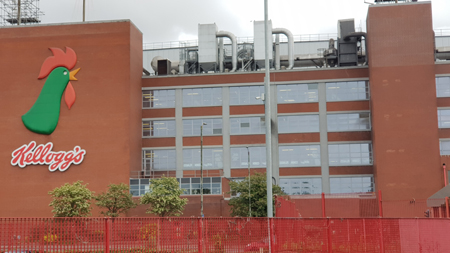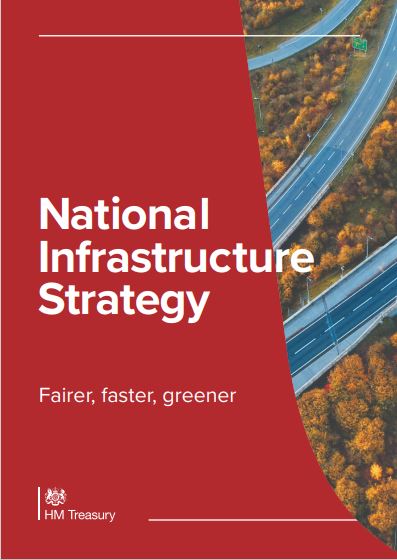In today’s Spending Review from Chancellor Rishi Sunak, the takeaway points for the recycling and waste management sector were few. But, a National Infrastructure Strategy, published after his speech by the government, appears to be an important indicator for future delivery of a ‘greener’ approach to new projects and the ‘greening’ of existing sites.
The Strategy also confirms that local authority costs of “processing packaging waste” will be switched to manufacturers and sellers (see below).

Chancellor Rishi Sunak
In his speech, the Chancellor said that local authorities would be able to increase their core spending power by 4.5% and that public sector wages, apart from the health service and those earning less than £24,000 would be frozen.
Labour
Labour’s shadow business minister, Lucy Powell, said that the pay freeze will be incredibly disappointing and didn’t make sense “economically”. She said for public sector workers delivering services during the pandemic, such as bin collectors, it was a “kick in the teeth”.
Infrastructure
Mr Sunak also spoke of infrastructure and investment plans. “To help finance our plans, I can also announce we will establish a new UK infrastructure bank. Headquartered in the north of England, the Bank will work with the private sector to finance major new investment projects across the UK – starting this spring.”
In the foreword to the National Infrastructure Strategy, Prime Minister Boris Johnston writes: “Our environmental agenda, set out in our recent ten-point plan, is fully reflected in this Strategy, with ambitious commitments on energy, decarbonisation and clean economic growth driving us towards net zero in 2050. Our new industrial revolution will create and support up to 250,000 green jobs.”
A dierct referencing of waste and recycling facilities is given in the document: “This Strategy focuses on economic or networked infrastructure: energy, transport, water, waste, flood risk management and digital communications.” And, it also comments that “Infrastructure acts as a direct ‘input’ for businesses, which rely on energy, transport and waste collection to operate.” However, no specific projects are mentioned.
Carbon capture
One topic though in which the waste sector could get involved is in carbon capture and storage. Suez recently announced (see letsrecycle.com story) that it had signed a memorandum of understanding with oil and gas company BP to explore carrying out the “UK’s first” carbon capture and storage project from energy from waste (EfW). The aim is to capture the CO₂ emissions from one of the four EfW facilities it operates in the Teesside area. And, today’s government Strategy said that “the North East of England could become a home of choice for companies delivering carbon capture and storage; making hydrogen power a part of daily life; and designing, building and maintaining offshore wind turbines.”
Net Zero Review
No details of environmental taxation were given today but the Strategy says that the findings of a Net Zero Review will be available within six months – this is likely to have an impact on environmental taxation policy.
Packaging waste
On the Environment, the Strategy confirms how the costs of “processing packaging waste” under a reformed PRN system will switch the cost from councils to manufacturers and sellers. The Strategy states: “The UK also needs to go further in increasing its resource-use efficiency, to reduce the burden placed on the natural world through the supply of raw materials and absorbing waste.

Manufacturers, such as Kellogg’s, will have to meet the costs of processing packaging waste
“The Environment Bill is legislating wide-reaching waste reforms – including extended producer responsibility (EPR), a deposit return scheme, and consistent collection of food waste and recycling – which will increase resource-use efficiency and cut greenhouse gas emissions from their implementation in 2024. EPR will ensure that the costs of processing packaging waste are transferred from local authorities to manufacturers and sellers.
“This will encourage innovation in packaging design, leading to a more sustainable use of resources. In order to prevent the build-up of waste, it is important to be able to follow its journey through supply chains. New waste tracking technology in the UK is the future of a high-tech circular economy underpinned by world class digital infrastructure, and will ensure that all waste movements across the economy can be tracked, supporting resource efficiency as well as informing sustainable future infrastructure investment.”
The post Sunak unveils National Infrastructure Strategy appeared first on letsrecycle.com.
Source: letsrecycle.com Packaging



